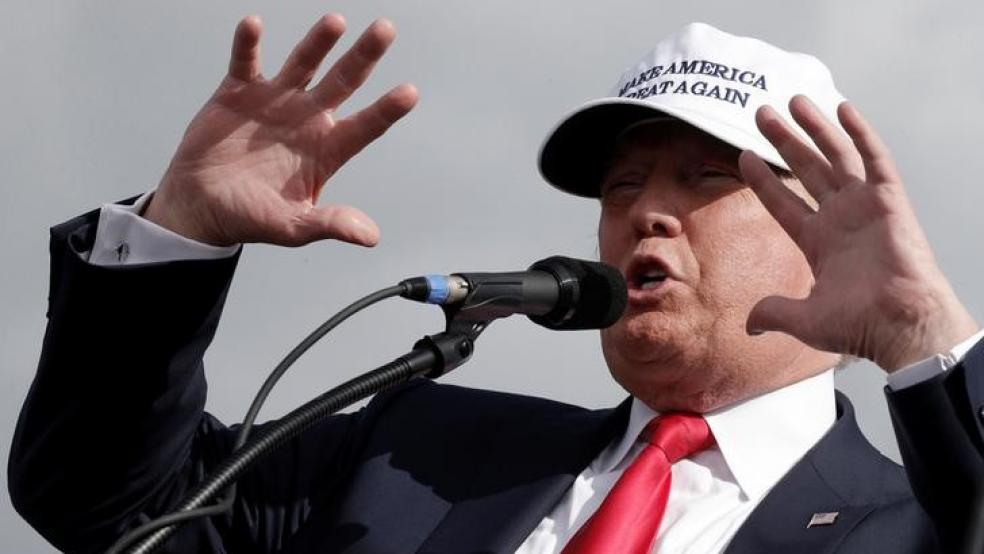When they meet for their third and final presidential debate Wednesday night, Republican nominee Donald Trump and Democratic nominee Hillary Clinton may be more inclined to exchange blows than to shake hands.
With less than a month before the election, the campaign atmosphere has become so toxic with dueling allegations of sexual misconduct, political and business corruption, voter fraud and international intrigue and conspiracies that it’s hard to imagine either one acknowledging the legitimacy of the other after the November 8 election.
Related: Donald Trump: A Global Conspiracy Is Out to Get Me
Voters on both sides of the aisle appear uneasy about rejecting the next president, whoever that may be. Trump has threatened to investigate and jail Clinton for alleged corrupt activities in destroying government emails and exploiting her position as secretary of state to raise money for her family’s global foundation, while Clinton has denounced Trump as unfit to serve as commander in chief and have his hand on the nuclear codes.
With growing signs in the polls that Clinton will prevail in the election, it seems almost inconceivable that Trump would acknowledge the legitimacy of the next president – just as he spent years fueling a “birther” movement questioning whether President Obama was born in Hawaii and was entitled to sit in the White House.
“Yeah, a concession is hard to imagine,” said Larry Sabato, director of the University of Virginia’s Center for Politics. “Trump has already lined up his bad guys: crooked Hillary, globalists, the media except for Sean Hannity, voter fraud, and so on. His base won't accept his loss either. The Republic will survive, but we won't come together after the election.”
Ron Bonjean, a Washington policy adviser and former Republican congressional spokesman, had this to say: “It does seem that Trump will not concede the election to Clinton if she were to win in November because it would be outside of his character. It’s unclear what the fallout would be for the election process because he is viewed as a political disruptor who rails against all institutions in general. If he were to concede, it would disappoint the strongest of his supporters who he will likely tap into for future endeavors.”
Related: Trump to Add NY Times Backer Carlos Slim to His Conspirators’ List
This weekend, in fact, Trump moved from making suggestions that the election might be “rigged” to an outright assertion, both on Twitter and in an appearance in New Hampshire that the election is being illegitimately handed to Clinton. He was joined by Alabama Senator Jeff Sessions, who agreed, “They are attempting to rig this election.”
A new survey by the Pew Research Center shows that Americans on both sides of the aisle are uneasy about this question, and feel strongly that the loser must concede to the winner.
The survey was conducted online from September 27 to October 10 among 4,132 adults, including 3,616 registered voters. About six in ten voters think Clinton will win the election while only 34 percent expect that the billionaire real estate businessman will win.
At the conclusion of the election, voters say that it is either very important (53%) or somewhat important (24%) for the losing candidate to acknowledge the winner as “the legitimate president of the country,” according to the Pew study. Just about one in five, or 22 percent, say a public concession by the losing candidate is “not too” or “not at all important.”
Related: This Dreadful Election Is Taking a Toll on Consumer Confidence
“Clinton supporters (60%) are more likely than Trump supporters (51%) to view a concession as very important,” according to Pew. “Only about one in five of each candidate’s supporters (21% of Trump backers, 16% of Clinton backers) say this is not important. By contrast, roughly twice as many Johnson and Stein supporters (41%) think it is not too or not at all important that the losing candidate publicly acknowledge the winner as the legitimate president.”
Ross Baker, a Rutgers University political scientist, said, “I think it’s enormously important that the loser concede and I think it would be unrealistic to think that he’s going to concede that way. I think he [Trump] will continue to say that the process is rigged and it will damage the country considerably. And I think it will leave a substantial portion of the population – if they follow his example – to deny the legitimacy of the election of Hillary Clinton, which is very dangerous. I think to admit that the election is over and that it was a fair fight is to admit that he’s a loser. He can’t admit he’s a loser by the very definition of what he stands for.”
“I think that if a substantial number of Americans feel that somehow Donald Trump was done out of this by some kind of skullduggery, both on the part of Hillary Clinton and the media, I think that this anger will continue,” he added. “And I think this anger leads to desperate acts, and that’s what I’m afraid of.”






